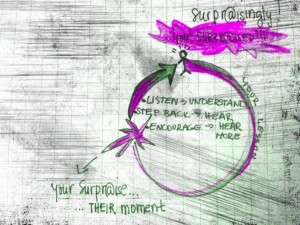Learning Isn’t Everything, But Wanting To Learn Is Vladimira Chalyova 
What is the first step you take on your own as you are discovering the world? And what makes you feel ready to take that step? As teachers and life-long learners, we wish and fear at the same time that every student will get to the point when they will not really need us anymore. For some students that’s true very early in their learning and some may never really feel comfortable enough to go beyond our lead and instruction. However, I believe that should be one of our aims as teachers, to build our students up so that when the moment comes, they not only can but also want to go their own way.
What really is learner’s autonomy? The father of that definition, Henri Holec, tells us that it is the ability of the learner to take charge of their own learning. For me it is not only ability but also willingness to do that. And that may come with or without ability I think.
Winning isn’t everything, but wanting to win is.
Vince Lombardi
What if we substitute winning for learning and win with learn in the quote above? Would that define autonomy? Certainly it would for me: Learning isn’t everything, but wanting to learn is? Given this, I realize that what we need to nurture in our students, sometimes even more than information and ability, is their perception and awareness of opportunities and courage to take them even though they make bring some failures sometimes. It is teaching them as they make mistakes, as they take risks and find more than just what we present to them.
What does that means in the classroom? It means supporting our students’ motivation if they have it, counting on their curiosity if they lack motivation and through surprising discoveries making them want to go deeper. Most of all it means, giving our students space and time for discoveries, appreciating their effort and leading them gently towards other new challenges. It also means taking those small steps with them at the beginning, building the routine of exploration and experiment, as well as praising their trials and loses.
It is not enough to take steps which may some day lead to a goal; each step must be itself a goal and a step likewise.
Johann Wolfgang von Goethe
This post may not be a clear and definite answer to what learner autonomy is but surely it is an example of what it could be. The style, content and result of this post are examples of the writer’s autonomy. As I learn how to put my beliefs on paper and find courage to share them with others, as I experiment with style and take risks by taking it in a bit different direction, I learn to express myself more clearly and learn who I am and who I want to be. I absorb a lot of practical knowledge on the way and as I come to feel comfortable with it, I feel safe sharing it, and I will want to do that again, hopefully again better.
What is it you want to build in your students? Are you autonomous enough to let them take their own route or should you take that journey with them?



Great post Vladka. I absolutely agree that there are times when you worry that your students won’t need you anymore or that they would get lost without your benevolent guidance.
It’s interesting to see how similar our worries as parents are. And I think the answer is the same, too: I don’t want my children/students to need me, I want them to want to be with me because it fills them with a sense of security, tolerance, love which encourages further exploration, learning and experimenting.
I believe that empowering learners/children breeds a healthy relationship that’;s much more permanent and meaningful to teacher/parent and students/children.
Thanks again for this wonderful post, I really enjoyed reading it.
Hi Vladimira. I enjoyed reading your post.
A question: Are you aware of a questionnaire/survey that measures learner autonomy? I would like to become more aware of how my students (teens & adults) rate themselves on this trait.
Peter
Mexico
Thank you Tamas! You are right and I am happy you enriched my post by reflecting on it as a parent. It is very true the same applies to children/parents and maybe using your comparison people can relate to it even better.
Thank you again
Dear Peter,
Thank you for reading and comment as well. To be honest, I don’t know about any kind of survey to measure amount of being autonomous.
But if you are just interested in howtheysee themselves, observe them more closely, notice how safe and comfortable they feel expressing themselves and how much they are willing to experiment with learning,learning styles. Obviously, does their learning go beyond classroom? How much and how willing are they to share with you?
I don’t think you need a survey to find that out, listen to your students and listen to what is not spoken as well.
Maybe one example, I always give my students my email address to contact me if they have any problem or question. What happens most of the time though is that I get emails with what they found related to what I shared with them in class. I didn’t ask them to do so but I can see they took it out and went on in their own discoveries.
I will be happy to share more if you have any other question.
Vladka
Dear Vladka,
Firstly I love your flair for writing, the way you entwine one word to another so delightfully . It’s an amazing read, Vladka. Loved every moment of it. I think at times, I’d love to take the journey with my learners, not leading them but walking hand in hand, for I myself would become a learner at that very moment.
Keep up your good work, Vladka. I’m so inspired just to reading this post. I hope to meet you sometime in the future.
Ratna